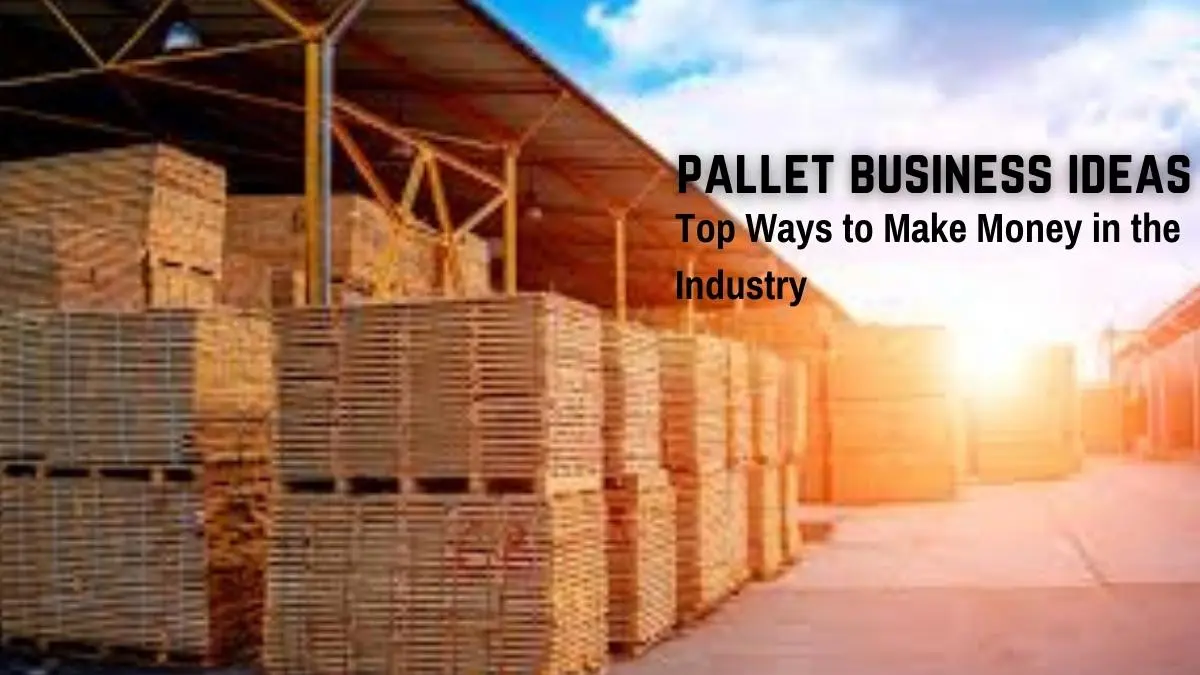BUSINESS
Pallet Business Ideas: Top Ways to Make Money in the Industry

The pallet business is more than just moving wooden planks around. It’s a booming industry. Almost every warehouse, factory, and retailer needs pallets. They’re essential. That means opportunity. People overlook them, but pallets hold the world together—literally. New or used, they’re in demand. The best part? You don’t need a huge budget to start. Just strategy. A smart plan. And a good network. Many entrepreneurs begin with zero investment. They find discarded pallets, fix them, and sell for profit. Others dive straight into manufacturing. Either way, money is waiting. If you’ve ever thought about starting a pallet business, now’s the time. Let’s break down everything you need to know.
Understanding the Pallet Industry
The pallet industry is massive. Billions of pallets circulate globally. Every sector depends on them. Retail, logistics, food, e-commerce—everyone needs pallets. But not all pallets are the same. Wooden, plastic, metal. New and recycled. Some businesses need heat-treated pallets for exports. Others prefer used pallets to save costs. If you understand demand, you unlock profit. Some focus on selling to local businesses. Others export pallets in bulk. The key? Knowing what’s needed where. That’s what separates amateurs from pros. The pallet business is all about solving supply chain problems. If you can do that, you’ll never run out of customers.
How to Start a Pallet Business
Starting a pallet business is simple. No fancy degrees. No huge investment. Just action. First, decide your niche—manufacturing, recycling, or resale. Then, check local regulations. Some areas require licenses. Others don’t. Next, get equipment. A truck helps. So do gloves and tools for repairs. Now, sourcing. Find free pallets at warehouses, grocery stores, or construction sites. Talk to businesses. Offer solutions. Fix broken pallets. Resell. Or, if making new ones, find a lumber supplier. Customers? Easy. Local companies. Online platforms. Even global buyers. Start small. Scale fast. The best pallet businesses begin with one thing: momentum.
Finding Pallet Suppliers for Your Business
Suppliers can make or break your pallet business. Where do you get pallets? Free ones—check local businesses. Supermarkets. Factories. They often discard pallets. Negotiate deals. Offer to haul them away. Need bulk? Contact lumber yards or wholesalers. Buy at a discount. Another option? Networking. Join industry groups. Attend auctions. Sometimes, businesses liquidate pallets cheap. Always compare prices. Quality matters. Don’t buy weak, broken pallets unless you plan to refurbish them. The better your supply, the higher your profits. Build relationships with reliable sources. It keeps costs low. Margins high. And the business running smoothly.
Pallet Business Ideas & Ways to Make Money
Money in pallets? Plenty. But how do you get your slice? Multiple ways. Some people manufacture new pallets. Others repair and resell used ones. Then there’s the brokerage game—buying and selling in bulk. Fancy creativity? Turn pallets into furniture or decor. Want passive income? Start a pallet rental service. Even hauling discarded pallets earns cash. The trick is knowing your market. What’s in demand? Who’s buying? Whether you’re flipping pallets, producing them, or repurposing them, there’s money waiting. The best strategy? Pick one path. Master it. Then expand. The pallet business rewards those who stay sharp.
Where to Sell Pallets and Pallet Products
Selling pallets isn’t complicated. But strategy matters. First, local businesses. Warehouses. Factories. They need pallets daily. Talk to managers. Offer competitive pricing. Then, online platforms. Facebook Marketplace. Craigslist. Alibaba. Even eBay. People buy pallets everywhere. Some entrepreneurs export in bulk. Others sell to recycling centers. Another option? Custom orders. Some companies need branded pallets. Others want unique sizes. If you’re creative, even furniture stores might buy. The key? Know where demand is. Find the right buyers. Then keep them happy. A steady customer base means a stable pallet business.
Marketing Strategies for a Pallet Business
Marketing a pallet business isn’t about flashy ads. It’s about visibility. First, a website. Basic but professional. SEO helps. People search for “pallets near me” all the time. Be the answer. Social media? Works wonders. Post on Facebook. Join business groups. LinkedIn helps, too. But the best marketing? Word of mouth. Get a happy client. They bring others. Also, networking. Join logistics meetups. Attend trade fairs. Let people know you exist. The more you connect, the more you sell.

Challenges in the Pallet Business and How to Overcome Them
Every pallet business faces challenges. Rising wood costs? Source cheaper. Find bulk deals. Logistics? Trucks break down. Plan ahead. Competition? Differentiate. Offer better service. One big issue? Storage. Pallets take space. If you don’t manage inventory well, you’ll drown in stock. Another challenge? Quality control. Sell bad pallets, lose trust. And trust is everything. Overcoming these hurdles separates side hustlers from serious entrepreneurs. Plan smart. Stay flexible. Success follows.
Profit Potential & How Much Money You Can Make
So, how much can you make? Depends. Small-scale pallet resellers make $500-$2,000 monthly. Full-time businesses? $10,000 or more. Large operations? Six figures. Margins vary. Free pallets mean pure profit. Buying and reselling? Lower margins but high volume. Manufacturing? Higher costs but steady income. The trick? Efficiency. Keep expenses low. Maximize sales. The pallet business isn’t get-rich-quick. But it’s definitely get-rich-steady.
Tools & Equipment Needed for a Pallet Business
Basic tools? Hammer, nails, saws. Got more budget? Get an air nailer, pallet jack, and band saw. Trucks help, too. Safety gear is crucial. Gloves. Steel-toe boots. Some go all-in with automated machines. But truth is, you don’t need much to start. Just essentials. A good pallet business grows with better tools over time. Start simple. Scale up.
Legal Considerations & Business Registration
Paperwork isn’t fun. But necessary. Depending on location, you might need permits. Especially if dealing with pallet recycling. Environmental laws exist. Get a business license. Set up taxes properly. Liability insurance? Smart investment. Protects against unexpected losses. Being legally prepared avoids headaches later. Do it right from the start.
Conclusion
The pallet business is more than just buying and selling wooden platforms. It’s a steady, high-demand industry with endless opportunities. Whether you start small by flipping used pallets or dive into manufacturing, there’s real money to be made. Success comes down to strategy—finding the right market, keeping costs low, and delivering quality. Challenges? Sure. Every business has them. But those who stay persistent, adapt, and build strong customer relationships will thrive. The best part? You don’t need a fortune to start. Just the right mindset and a willingness to take action. If you’ve been thinking about getting into the pallet business, there’s no better time than now. The opportunity is waiting. Will you take it?
-

 BIOGRAPHY9 months ago
BIOGRAPHY9 months agoBehind the Scenes with Sandra Orlow: An Exclusive Interview
-

 HOME1 year ago
HOME1 year agoDiscovering Insights: A Deep Dive into the //vital-mag.net blog
-

 HOME1 year ago
HOME1 year agoSifangds in Action: Real-Life Applications and Success Stories
-

 BIOGRAPHY1 year ago
BIOGRAPHY1 year agoThe Woman Behind the Comedian: Meet Andrew Santino Wife




























